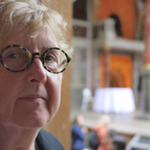Below, a Lagoon
Off on a tangent, the rest of shape
swaggers, Zigzagging in the foam
that lends its greenness. The Aquatic
stems, fluid on the tide,
move as a coordinated mass
Removed by an earlier quake,
by a shadow. You Want and Do Not
Want that shadow, Everything. What
he knows is so little, tiny crystals In the
sleeping palm. In the open
palm. The garden asphalt
exudes Serenity, the mother
flies over the rooms and the past
Sometimes dissolves. A tree gets
cut blacker than night, and the
Sound of the leaves seems like
stems that stirring en masse
touching Shadow bronzing on that
blanket the Prisms of bliss.
To be Overwhelmed There, in dailyness
the infinitesimal of deterioration. That since
its appearance argues in harmony
this time passes, tomorrow passes. The
episode hanging by a thread, from a
tree, in summer.
Millais’ Ophelia
The bed is a dark and green bed that seems transparent. Here lies the lovely one half-closed eyes that take note of a thousand-year-old glass. The flowers scattered in the water are as fresh as if they were alive, and it’s not clear whether or not some of the flower-covered branches have fallen from the bushes on shore. There are stones in the back and the dress is embroidered in gold with foliage and with tassels that are also flowers filling the surroundings with an unparalleled spring. The greenness is disrupted by a light Prussian blue, as if underneath, that grazes the scene offering a patina of dusky air. What time is it in this depiction? The light, oblique as a willow, also dyes its aquatic sprigs and the face of the dead woman, wrapping all of it in an atmosphere extended toward that same light which illuminates it. In what suspended moment of leaves and flowers and exposed face is this vision revealed? The mignonette face, the half-open lips, the light eyes, the hands facing upwards, palms extended. There is a slight cut in the line of the arm that stands out over the water line. The palms extended in this way – are they requesting, hoping to receive, asking? The metallic dress – of embroidered gold – the hair extended on both sides of the body that, drenched, hints at itself and appears in parts; the face, as much of silk and wax around which a color still grazes, a blush of life a trifle of air between the lips, the white neck, the torso just hinted at below the breasts; the waist and pelvis lost under the water. And over the legs her dress is floating – a little inflated with air and water, easily mistaken for the river’s bottom or shore – over the gold grow leaves and some roses that have abandoned their wreath. There is a communion between the light, leaves and flowers, Ophelia dead – her hands facing up, her eyes and mouth half-open– the water. There is something expectant that spreads, disturbed by the light and patina of air, by the living and the dead, by the suspended instant that offers itself and the prolonged escape that the half-open eye tells.
Abajo, una laguna
Tangente por el resto de figura
corcovea Zigzaguente en la espuma
que deja su verdor. Los tallos
Acuáticos vellosos en marea se
mueven como masa conjunta
Removidos por un sismo anterior,
por una sombra. Quiere y No
Quiere por esa sombra, Todo. Lo que
sabe es tan poco, cristalitos En la
palma dormida. En la palma
entreabierta. Serenidad trasunta El
macadam del fondo, la madre
sobrevuela las estancias y el pasado
A veces se disuelve. Un árbol se
recorta más negro que la noche, y el
Ruido de las hojas se parece a los
tallos que en masa se remueven
sobando Sombra curtiendo sobre esa
manta los Prismas de la dicha.
Apabullarse Ahí, en lo cotidiano lo
infinitesimal del deterioro. Que desde
la apariencia y en coro se discute
pasa esta vez, mañana pasa. El
suceso prendido con un hilo, de un
árbol, en verano.
La Ofelia de Millais
El tálamo es un agua oscura y verde que parece que tiene transparencia. Aquí yace la bella entrecerrados ojos que dan cuenta de un vidrio milenario. Las flores esparcidas por el agua están tan frescas como si estuvieran vivas, y no se aprecia bien si algunas de las floridas ramas no caen de los arbustos de la orilla. Hay piedras en el fondo y el vestido se borda dorado con ramaje y con borlas que también son flores empastando el entorno de una inigualable primavera. El verdor se trastoca hacia un azul de Prusia leve, como bajo, que campea por la escena dando una pátina de aire oscurecido. ¿Qué hora será en esta descripción? La luz, oblicua sobre un sauce, también tiñe unas varas acuáticas y el rostro de la muerta envolviéndolo todo en una atmósfera extendida hacia esa misma luz, que lo ilumina. ¿En qué momento suspendido de hojas y de flores y de rostro expuesto se expone esta visión? Metálico el vestido –de oro recamado– el pelo extenso a ambos lados del cuerpo que empapado se esboza y sobresale en partes: el rostro, tan de seda y de cera por el que todavía campea un color, un rubor de la vida una minucia de aire entre los labios, el blanco cuello, el torso hasta los senos insinuados; la cintura la pelvis, se pierden bajo el agua. Y sobre las piernas vuelve a flotar el vestido –un poco inflado de aire y agua, se confunde con fondo o con orilla– sobre el oro crecen hojas y unas rosas abandonadas de guirnalda. Hay una comunión entre la luz, las hojas y las flores, Ofelia muerta –las manos hacia arriba, los ojos y la boca entreabierta– el agua. Hay algo de expectante que se extiende e inquieta por la luz y la pátina del aire, por lo vivo y lo muerto, por el instante en suspensión que se ofrece y la fuga pertinaz del que el entreabierto ojo da cuenta.
Translators’ Note:
As translators, we have both dedicated ourselves to the sharing of work by women poets from Uruguay, South America’s smallest Spanish speaking country. Starting with early poets such as Delmira Agustini (1886-1914), Uruguay has a long tradition of poetry by women that continues in an unbroken line, generation to generation, down to the present. Silvia Guerra’s poetry engages deeply with what it means to be Uruguayan and to be a woman in Uruguay. She was raised on the coast in Maldonado and her poems that draw many of their images from its beaches and the countryside, not in a simple, narrative way, but rather as symbols of the exploration of her own consciousness. Indeed, her poems are a form of continual meditation which play continually with the transformation and transmutation of words and through all her work runs a hunger for meaning, for a reason to exist.
About Guerra’s work, the critic María Rosa Olivera Williams has stated, “[Guerra’s] writing, aware that it enters language from a female body exiled from language, does not permit a gentle, joyful flight; instead, the author must explore the contours of that body again and again through words to the point of fragmentation, decomposition; when that body has turned into memory, it becomes the platform from which she observes and speaks. In this way poetry becomes knowledge.”
We suggest that Guerra’s writing – which is always challenging – is in itself a translation. As Virginia Woolf and the other early twentieth century modernists attempted to translate the flow of human consciousness into their writing, as Hélène Cixous urged women to transform their subjectivity into language for écriture féminine, Guerra shatters clichés, breaks through grammatical and stylistic conventions, and digs as deeply as she can into the shifting sands of language to seek the truths that lie beneath. But as it turns out, these truths are just as amorphous and fleeting; images or emotions appear before the reader like an exquisite piece of driftwood before being swept back to sea. Her marvelous poetry deserves to be known and read widely and we are delighted to have these poems in Anomaly.

Jesse Lee Kercheval is a poet and writer as well as a translator, specializing in Uruguayan poetry. Her translations include The Invisible Bridge/ El puente invisible: Selection Poems of Circe Maia for which she was awarded an NEA Fellowship in Translation and the forthcoming Poemas de amor/ Love Poems by Idea Vilariño both from the University of Pittsburgh Press. She is the Zona Gale Professor of Poetry at the University of Wisconsin-Madison. More information at jlkercheval.com.

Jeannine M. Pitas is the author of the poetry collection Things Seen and Unseen. She is the translator of the Uruguayan poet Marosa di Giorgio including I Remember Nightfall and The History of Violets, both published by Ugly Duckling Presse and Carnation and Tenebrae Candle, forthcoming from Cardboard House Press. Her latest translation, We Do Not Live In Vain by Uruguayan poet Selva Casal, was just published by Veliz Books. She lives in Iowa and teaches at the University of Dubuque.

Silvia Guerra (1961, Maldonado, Uruguay) is an Uruguayan poet, critic and editor whose books include Un mar en madrugado (2018); Pulso (2011), and Estampas de un tapiz (2006); Nada de nadie, (2001); La sombra de la azucena, (2000); Replicantes Astrales (1993), Idea de la aventura (1990); De la arena nace el agua (1986) and Fuera del relato (2007), a fictionalized biography of Lautréamont. She is a member of the executive boards of both the Mario Benedetti Foundation and the Nancy Bacelo Foundation. In 2012 she was awarded the Morosoli Prize in Poetry for her career.

 BACK TO ISSUE
BACK TO ISSUE